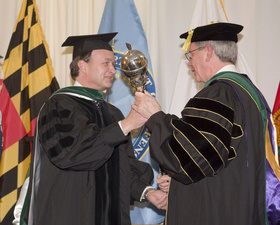|
WASHINGTON, Feb. 8, 2006 – Research done at the Uniformed Services University of the Health Sciences advances medicine and improves public health, the university's new president said here yesterday.

William Winkenwerder (left), assistant secretary of defense for health affairs, presents Dr. Charles L. Rice with a mace during Rice's installation ceremony as the fifth president of the Uniformed Services University of the Health Sciences in Bethesda, Md., Feb 7. Photo by Tech. Sgt. James Steele, USAF
(Click photo for screen-resolution image) |
|
"From developing vaccines for lethal viruses to fundamental research in radiation biology, our faculty advances the boundaries of science," Dr. Charles L. Rice said during his installation ceremony as the fifth president of USU. "They pioneer translational research to improve military medicine and the public's health." The university is a federal health sciences school that educates doctors, nurses and other health care professionals for the Department of Defense. Congress created the fully accredited medical school and graduate school of nursing in 1972. "This institution is singularly charged with teaching its students to care for those in harm's way. Our mission is not only about educating health care professionals, it is also about developing leaders," Rice said. "From the bayous of Louisiana and Mississippi to earthquake-torn Pakistan to the battlefields of Iraq and Afghanistan, our university prepares doctors, nurses and scientists who care for people." Rice also spoke about the great work being done by USU alumni. "Our accomplished alumni serve their country around the world," he said. He listed locations such as Balad, Iraq, Landstuhl Regional Medical Center in Germany, biomedical facilities at Fort Detrick, Md., Native American reservations, the National Institutes of Health, and "universities across the land." The men and women there "practice the clinical skills that we teach and that we refine through our research," he said. "They continue a tradition of excellence in military and public health medicine." Rice, officially sworn in as USU president July 1, 2005, is a Navy-trained surgeon and researcher. He has previously served as vice chancellor for health affairs at the University of Illinois at Chicago, as vice dean of the UIC College of Medicine, and on the faculty at various medical schools. He retired as a Navy captain in 2003 after serving for 37 years. As president of USU, Rice is responsible for overseeing academic standards and the research and service mission of the university. He will also serve as an adviser to the Assistant Secretary of Defense for Health Affairs. "When we began our search for a new university president, we wanted a visionary," Dr. William Winkenwerder, assistant secretary of defense for health affairs, said during the ceremony, "someone one who can implement institutional change, while fostering and developing young minds of the military health system." In addition to finding a president with strong academic credentials, "we needed a strong leader who understood the U.S. military structure and who grasps the nature of military missions and the vital role of the men and women of the military health system," Winkenwerder added. "In Dr. Rice we have a leader who will take us to the next level." During the ceremony Rice also talked about the impending realignment of the university under the forthcoming multiservice facility here. "A critical element of our distinctive environment is our affiliation with the local military hospitals with whom we are about to embark on a transformative journey," Rice said. He was referring to the closing of Walter Reed Army Medical Center at its current longtime location in nearby Washington and its merger with the current National Naval Medical Center here under approved 2005 Base Realignment and Closure Commission plans. "With the creation of the Walter Reed National Military Medical Center, we look toward the horizon and see a world-class academic medical center with our university playing a vital role," Rice said. "I am inspired by our university's past and I am excited for its future," Rice concluded.
|